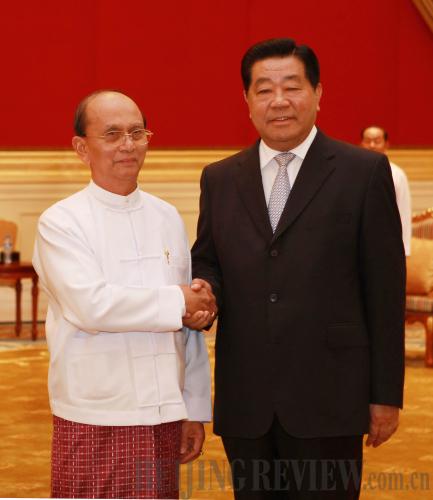|
 |
|
BOOSTING TIES: Jia Qinglin (right), visiting Chairman of the National Committee of the Chinese People's Political Consultative Conference, meets with Myanmar's President U Thein Sein in Nay Pyi Taw on April 4 (LIU WEIBING) |
The organization and personnel arrangement of the new government show the government will be committed to promoting development, offering services and strengthening national unity. The military government, however, focused on maintaining social order and guaranteeing the military's administration.
President U Thein Sein has extensive experience in both political and military affairs, which will help him effectively coordinate the relationship between the military and the government. From 2007 to early 2011, he acted as prime minister of Myanmar, and participated in the drawing up of the country's roadmap to democracy. Vice President U Tin Aung Myint Oo has been in charge of the country's economic and financial affairs for a long time, and this experience will be helpful as the country focuses on economic development.
The new government also includes a number of social elites. For instance, it has appointed a university president as minister of education. These technocrats have more professional knowledge than their predecessors from the military. Moreover, Myanmar's new-generation politicians are mostly in their 50s or 60s, and are on average at least 10 years younger than leaders in the military junta.
Vice President Sai Mauk Kham is from the Shan ethnic group. There are 135 ethnic groups in Myanmar, making national reconciliation one of the country's major tasks. Shan, the largest ethnic minority in Myanmar, is of great importance for national reconciliation. The Shan State is the biggest state in the country. Several ethnic militant groups are currently operating in the state, with a total of 30,000 fighters.
Sai Mauk Kham is well respected by his people. No person from a minority ethnic group has assumed such a high-ranking post during the past 50 years. The government hopes to realize national solidarity and establish a sense of identity among all ethnic groups in virtue of Sai Mauk Kham's influence.
President U Thein Sein said he would establish a government of justice and integrity in his inaugural speech, calling for national unity and reconciliation. He laid emphasis on promoting economic growth, establishing a market economy and inviting foreign investment. The new government will also amend Myanmar's laws to boost economic development and protect the environment. By trying to improve its image at home and abroad, it brings new hopes for the underdeveloped country.
Myanmar's special national conditions dictate the country can neither return to the junta era, nor can it carry out drastic democratic reforms in one swoop. It needs a steady and progressive way to realize reform and development. The military will continue to serve as a stabilizer for the country. The multi-party election in November last year and the inauguration of the civilian government in March this year opened the door to further changes in Myanmar.
The new government, of course, still faces a host of challenges, such as a crashed economy, opposition from former NLD leader Aung San Suu Kyi, ethnic militants and sanctions imposed by the United States and Europe.
The author is an assistant research fellow with the Institute of South and Southeast Asian Studies of the China Institutes of Contemporary International Relations | 